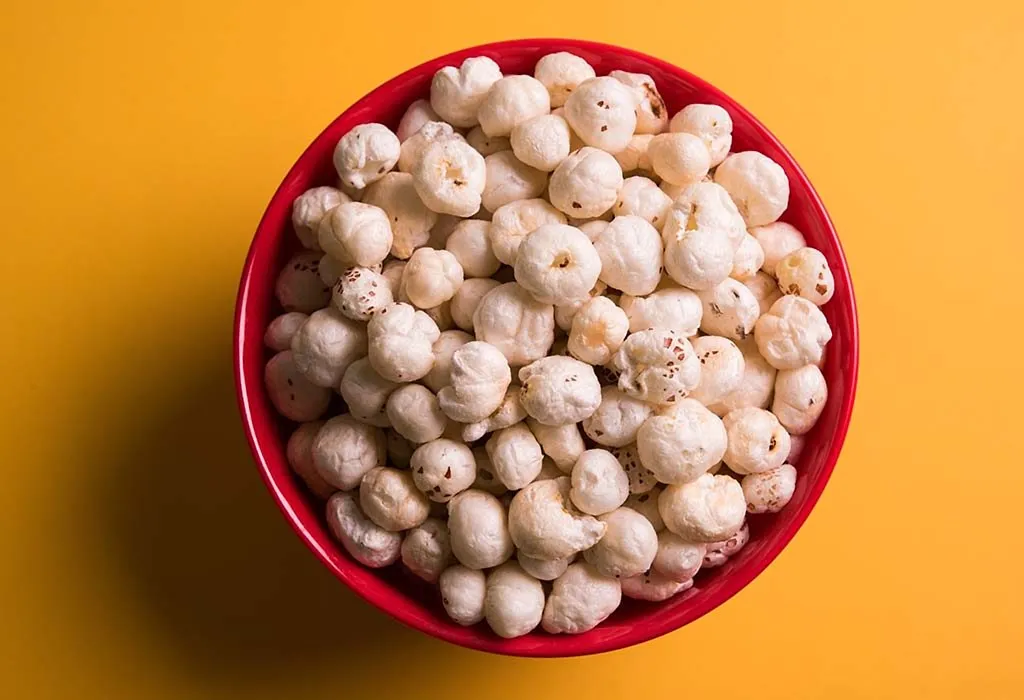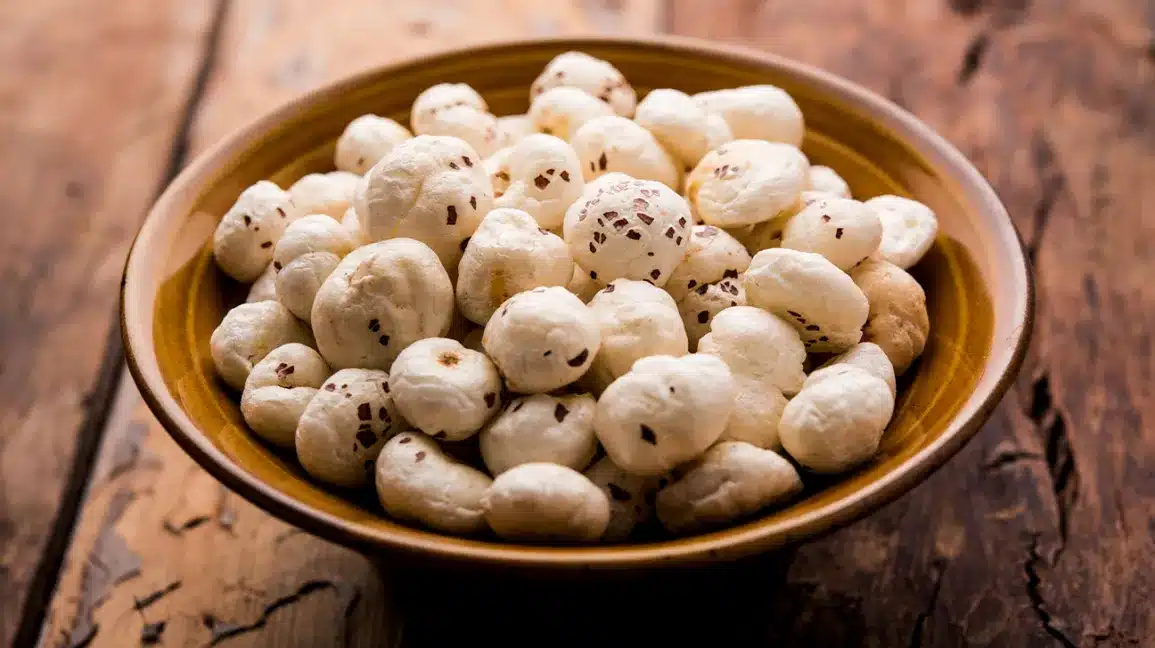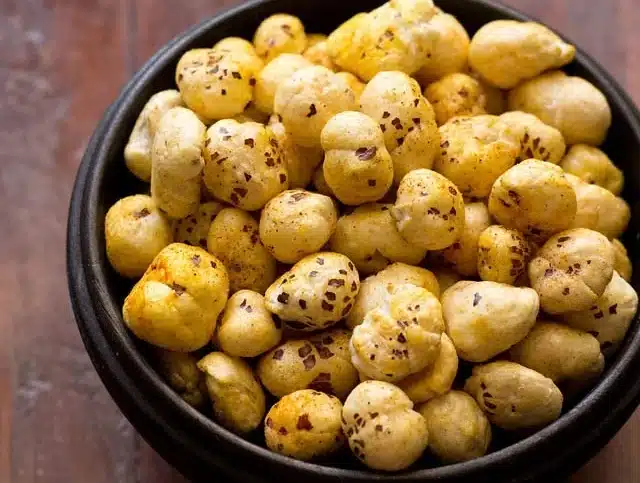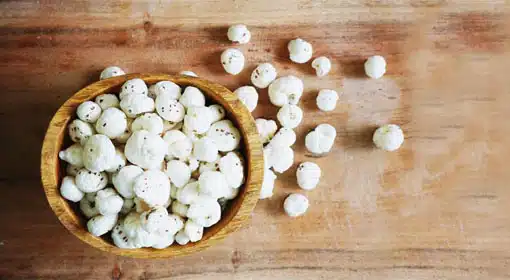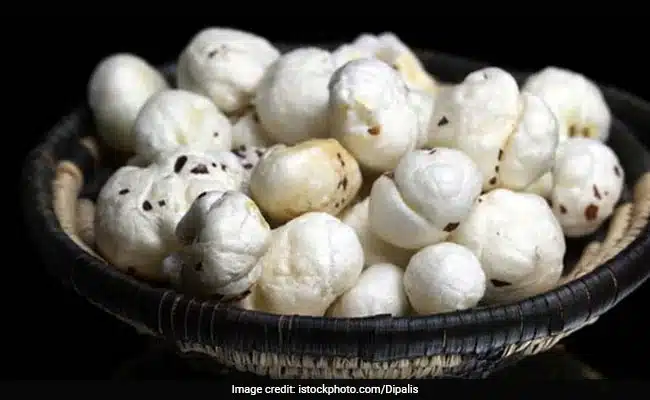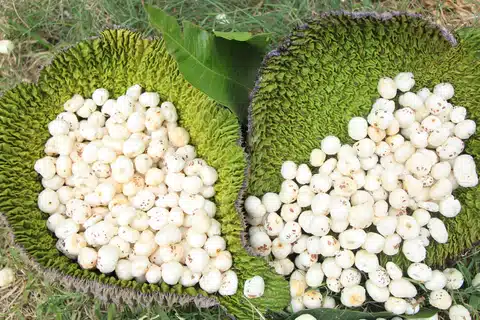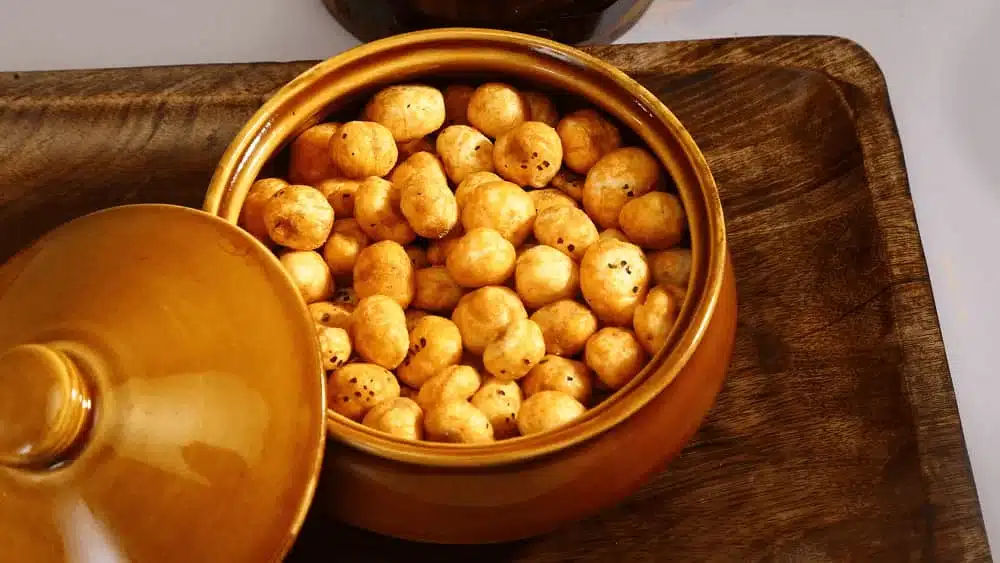Blog
Does makhana expire?

How long does makhana last?
How long makhana lasts varies on many things, like how it is stored, how it is packed, and whether it has been cooked or not. It is more likely that unroasted makhana will last longer than roasted makhana. Unroasted makhana can last up to a year or even longer if it is kept in a cool, dry place out of direct sunlight and in a container that keeps air out. However, it is very important to make sure that the container is well shut so that wetness and bugs don’t ruin the seeds.
However, baked makhana goes bad faster because it is exposed to heat during the cooking process, which makes it go bad faster. Usually, roasted makhana can be kept for three to six months if it is kept in the best circumstances. After this amount of time, the seeds may start to lose their crunch and taste, which means they are getting worse.
Does makhana go bad when it’s in the fridge?
While putting some foods in the fridge can help them last longer, if makhana is kept properly, you might not need to do that. Makhana doesn’t need to be chilled as long as it is kept in a cool, dry place in a container that keeps air out. Putting makhana in the fridge can add water, which can change its texture and taste.
If you live in a very hot or muggy area, on the other hand, and your pantry doesn’t protect against moisture and heat well enough, you might be able to store makhana in the fridge. In this case, make sure the makhana is kept in a jar with a lid so it doesn’t pick up any fridge smells.
The best way to keep roasted makhan
The best way to keep roasted makhana fresh and high-quality is to store it properly. These easy steps will help you store roasted makhana well:
- Cool All the Way Down: Let the cooked makhana cool all the way down before putting it in a storage jar. This helps stop humidity, which can build up wetness and make food go bad.
- Use Airtight Containers: Once the cooked makhana has cooled down, put it in a container that won’t let air in. To keep the makhana from getting dirty, make sure the jar is clean and dry before adding it.
- In a cool, dry place: Keep the roasted makhana in a sealed jar in a cool, dry closet or cupboard out of direct sunshine. Do not put it away near heat or water sources, like the stove or sink.
- Check for Spoilage Signs: Take a look at the roasted makhana every so often to see if it’s going bad, like if it smells bad or changes color in a strange way. If you see any of these signs, throw away the makhana right away.
By following these storage tips, you can keep roasted makhana fresh longer and enjoy its taste and crispiness for longer.
What to Look Out for in Spoiled Makhana?
Even if we do everything right, makhana can still go bad if it is not kept properly or if it goes past its expiration date. Here are some usual signs that makhana has been spoiled:
- Rancid Odor: Makhana that has been spoiled may give off a bad smell, which means that mold or bacteria are growing on it. It is best to throw away the makhana if it smells off or bad.
- Grown Mold: If you can see mold on the makhana’s surface, it’s clear that it’s going bad. Mold can grow in damp places or if makhana is exposed to water, which can make it less safe and less good.
- Changes in Texture: Makhana that has been spoiled may lose its crunchiness and become soft, mushy, or chewy. When the texture changes, the taste and general quality often go down as well.
- Staining: Any strange staining on the surface of the makhana, like dark spots or patches, could mean that it has gone bad. The color and look of fresh makhana should be the same all over.
If you see any of these signs, you should throw away the makhana to avoid getting sick from it or having other health problems.
How to Make Makhana Roast?
Not only does roasting makhana make it taste better, but it also keeps it fresh longer by removing the wetness. A simple way to roast makhana is shown below
- Set a pan or pot that doesn’t stick on medium heat.
- Add as much makhana as you want to the dry pan. To get even cooking, don’t put too many things in the pan at once.
- While moving the makhana often to keep them from burning, dry roast them until they are crisp and golden brown. It takes about 8 to 10 minutes to do this.
- Once the makhana are done, put them on a plate or tray to cool down completely.
- Follow the earlier keeping instructions and put the roasted makhana in a container that won’t let air in
With this easy cooking process, you can always enjoy freshly roasted makhana that is still crunchy and full of flavor.
Roasted Makhana: How Long Does It Last?
Because it is exposed to heat during the cooking process, roasted makhana doesn’t last as long as its unroasted cousin. Roasted makhana can stay good for about 3 to 6 months if it is kept in a cool, dry place in a container that keeps air out.
But it’s important to check for signs of spoiling every so often and throw away any makhana that looks like it’s going bad. By using the right methods for keeping and handling, you can make roasted makhana last longer and continue to benefit from its health benefits.
In conclusion, makhana does have a shelf life, but it can be extended by storing and treating it the right way. Whether it’s baked or not, makhana can be eaten as a healthy snack or added to different recipes as long as it’s kept properly and eaten before it goes bad. By learning the different ways that makhana goes bad and following the tips in this article, you can enjoy the taste of makhana while keeping it safe and fresh.
Here is a list of 10 frequently asked questions about the expiration of Makhana:
1. Does Makhana expire?
-
- Yes, Makhana does have an expiration date. It is recommended to check the packaging for the “best before” or “expiry” date.
- How long does Makhana last?
- The shelf life of Makhana can vary depending on the brand and storage conditions. Generally, it can last for 6 to 12 months if stored properly in an airtight container in a cool and dry place.
- What happens if I eat expired Makhana?
- Consuming expired Makhana may not necessarily cause immediate harm, but it can lose its taste, texture, and nutritional value. It is better to avoid consuming expired Makhana to ensure its freshness.
- How can I tell if Makhana has gone bad?
- You can check for signs of spoilage in Makhana, such as a rancid smell, mold growth, or an off taste. If any of these signs are present, it is best to discard the Makhana.
- Can I use Makhana past its expiration date?
- It is not recommended to use Makhana past its expiration date as it may not retain its original quality and taste. It is better to purchase fresh Makhana to enjoy its full benefits.
- How should I store Makhana to extend its shelf life?
- To prolong the shelf life of Makhana, store it in an airtight container in a cool and dry place, away from direct sunlight. Avoid exposure to moisture, as it can lead to spoilage.
- Can I freeze Makhana to extend its lifespan?
- Yes, you can freeze Makhana to extend its lifespan. Place the Makhana in a freezer-safe container or bag and store it in the freezer. It can last for up to a year when frozen properly.
- Does roasted Makhana last longer than raw Makhana?
- Roasted Makhana generally has a longer shelf life compared to raw Makhana. The roasting process removes moisture, making it less prone to spoilage. However, it is still important to check the expiration date.
- Can I still use Makhana if the package is damaged but the expiration date hasn’t passed?
- If the packaging of Makhana is damaged, it is best to avoid using it, even if the expiration date hasn’t passed. Damaged packaging can result in exposure to air, moisture, and contamination, which can affect the quality of the Makhana.
- Is it safe to eat Makhana that has been stored for a long time?
- Consuming Makhana that has been stored for a long time, even if it hasn’t expired, may not be advisable. It is recommended to consume Makhana within its recommended shelf life to ensure its freshness and nutritional value.
Remember to always follow the guidelines provided by the specific Makhana brand and the information on the packaging for the most accurate and up-to-date information regarding expiration and storage.



